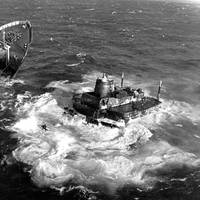Disasters at Sea & Their Impact on Shipping Regulation

The history of marine safety is soaked in water and written in blood. “I think that most people will tell you that changes in marine safety are almost exclusively disaster-driven,” agrees Dr. Josh Smith, a professor at Kings Point and interim director of the American Merchant Marine Museum. It hasn’t always been that way. Actually, it’s been worse. Despite some efforts early on to exert some control over shipping practices, going to sea has been accepted as a risky undertaking as long as man has floated vessels.
Proposed Rule, Non-Tank Vessel Response Plans
The U.S. Coast Guard announced the publication of a notice of proposed rulemaking designed to increase pollution response preparedness for non-tank vessels carrying oil as fuel upon U.S. waters. The proposed rule, entitled "Nontank Vessel Response Plans and Other Vessel Response Plan Requirements," would establish the content of response plans for oil discharges, helping non-tank vessel owners and operators understand how to comply with preparation and submission requirements for response plans under the Coast Guard Maritime Transportation Act of 2004. A non-tank vessel is defined as a self-propelled vessel of 400 gross tons or greater that is not a tank vessel, which operates on U.S. navigable waters carrying oil of any kind as fuel for main propulsion.
Tank Level or Pressure Monitoring Devices
The US Coast Guard issued a final rule removing its regulations for tank level or pressure monitoring devices on single-hull tank vessels carrying oil or oil residue as cargo. This rulemaking has had a long history. Such devices were originally required by the original version of the Oil Pollution Act of 1990 (OPA 90) and resulted in litigation when it was determined that no device capable of accomplishing its purpose on a ship at sea had been developed. Congress eventually revised the statutory provision to allow the Coast Guard some discretion in this matter, which has now been exercised. 73 Fed. Reg. 79314 (December 29, 2008). (Holland & Knight)
USCG Issues NPRM to Revise VRP
The U.S. Coast Guard issued a Notice of Proposed Rulemaking (NPRM) that would, if implemented, revise vessel response plan (VRP) salvage and marine firefighting requirements for tank vessels carrying oil. The proposal would clarify salvage and firefighting services that must be identified in the VRP. The resource providers must be specifically identified and must be integrated into the response organization. The NPRM includes tables indicating how soon various activities are to occur, based on the location of the incident. Firefighting equipment and other resources identified must be compatible with the vessel and its cargo. Comments on the proposal should be submitted by July 9, 2002. The Coast Guard plans to hold several public meetings in conjunction with this NPRM.







